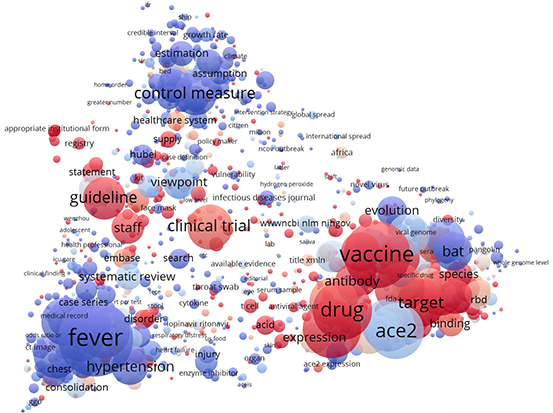Doing science in times of crisis: Science studies perspectives on COVID-19 (1st & 2nd edition)
The webinar series "Doing science in times of crisis: Science studies perspectives on COVID-19" started on 20 May 2020 during the early stages of the pandemic. The goal of this event is to connect and showcase COVID-19 science studies research from institutions around the world.
This article is an updated version of the webinar report in the ISSI Newsletter (#63, volume 16, number 3).
Introduction
In this post, we summarize the webinar series “Doing science in times of crisis: Science studies perspectives on COVID-19” and introduce the speakers and presentations. The webinar is embedded into a broader research line on COVID-19 at CWTS. More information on the relation between the research line and the webinar series is available in an interview by Rodrigo Costas at the InSySPo São Paulo Excellence Chair. An example of this research can be seen in Figure 1, which shows a visualization of clustered COVID-19 terms.
The 1st edition (20 May 2020)
The 1st edition of the webinar was organized by Ludo Waltman and Giovanni Colavizza at CWTS, while the speakers were affiliated with other institutions. The webinar was attended by almost 200 participants. The webinar was organized into the following three panels with a moderated discussion at the end of each panel.
Panel 1 “Debates on social media” included presentations on “COVID-19 publications: Citation indexes and altmetrics” by Mike Thelwall (University of Wolverhampton); “Media coverage of COVID-19 research” by Mike Taylor (Digital Science), and “Assessing the risks of "infodemics" in response to COVID-19 epidemics” by Riccardo Gallotti (Bruno Kessler Foundation – FBK, Trento).
Panel 2 „Societal questions“ provided a rich perspective through the following presentations. “How scientific research reacts to international public health emergencies: a global analysis of response patterns” by Lin Zhang (Wuhan University); “Early signals of a widening gender gap in publication frequency during the COVID-19 pandemic” by Jens Peter Andersen (Aarhus University), and "Consolidation in a crisis: patterns of international collaboration in COVID-19 research" by Caroline Wagner (Ohio State University).
Finally, Panel 3, entitled “Mapping COVID-19 research“ focused on the following talks. “The COVID-19 Open Research Dataset” was described by Lucy Wang and Kyle Lo (Semantic Scholar, Allen Institute for AI); “Tracking the growth of COVID-19 preprints” was presented by Nicholas Fraser (ZBW Leibniz Information Centre for Economics), and Simon Porter (Digital Science) dived deeper into “COVID-19 and preprint publishing culture”.
Based on the positive feedback on the first edition, we started a 2nd edition, which was a coordinated effort by CWTS and TIB Leibniz Information Centre for Science and Technology. This edition was organized by Ludo Waltman, Zohreh Zahedi, Grischa Fraumann, and Giovanni Colavizza.

The 2nd edition (8 September 2020)
The feedback from the 1st edition was taken into account to develop the webinar series further, for example, an additional focus was set on knowledge graphs, and we invited two speakers for that purpose. The 2nd edition was again structured into three panels with a moderated discussion at the end of each panel.
The speaker line up for Panel 1 “Pandemic effect“ was as follows. Milad Haghani (University of Sydney) presented on “Covid-19 pandemic and the unprecedented mobilisation of scholarly efforts prompted by a health crisis: Scientometric comparisons across SARS, MERS and 2019-nCov literature”; Wei Yang Tham (Harvard University) focused on “Quantifying the Immediate Effects of the COVID-19 Pandemic on Scientists”, and Serge Horbach (Aarhus University) reported on “Pandemic Publishing: Medical journals strongly speed up their publication process for Covid-19”. Stefano Canali and Simon Lohse (Leibniz University Hannover) presented together on “Epistemological aspects of evidence-based health policy: the case of Covid-19”, and finally Goran Murić (University of Southern California) talked about “COVID-19 amplifies gender disparities in research”.
Panel 2 “Social media“ included the following two presentations. “COVID-19 research and social media” was introduced by Rodrigo Costas (Leiden University), and Anders Blok (University of Copenhagen) talked about “How We Tweet About Coronavirus, and Why: A Computational Anthropological Mapping of Political Attention on Danish Twitter during the COVID-19 Pandemic”.
The final session, Panel 3 “Open science/open research” focused on a call for open science, and the above-mentioned knowledge graphs. For that, Jan Homolak (University of Zagreb) presented on ”Preliminary analysis of COVID-19 academic information patterns: a call for open science in the times of closed borders”; Jennifer D'Souza (TIB Leibniz Information Centre for Science and Technology) introduced “Covid-19 Bioassays in the Open Research Knowledge Graph”, and finally Maria-Esther Vidal (TIB Leibniz Information Centre for Science and Technology) described “How Do Knowledge Graphs Contribute to Understanding COVID-19 Related Treatments?”.
Connecting the community
The webinar included diverse speakers and an audience from the science studies community and beyond. As in all current events, participation from around the world is possible due to the virtual format. We believe that the webinar provided an opportunity to connect COVID-19 science studies research and that the participants could benefit from the presentations and discussions. A 3 hours event structured into three panels seems to be an appropriate format for this purpose, although the different time zones of the organizers and participants are sometimes challenging.
Finally, some presentation videos of the 2nd edition were edited by TIB Conference Recording Service and published at the TIB AV-Portal, a platform for scientific videos and events. We would like to thank especially the engaged speakers who swiftly accepted our invitation to present at the webinars.
Header image: Austin Distel






0 Comments
Add a comment